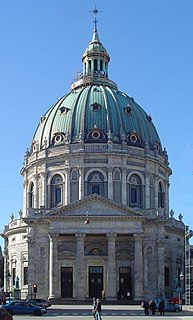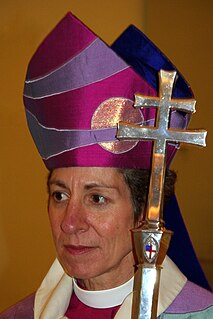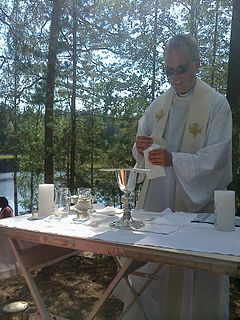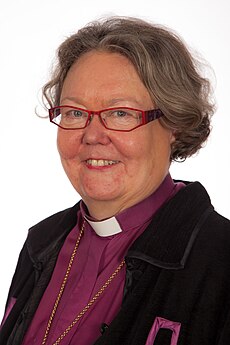
The Evangelical Lutheran Church of Finland is a national church of Finland. It is part of the Lutheran branch of Christianity. The church has a legal position as a national church in the country, along with the Orthodox Church of Finland.
The Scottish Episcopal Church is the ecclesiastical province of the Anglican Communion in Scotland.

The Evangelical-Lutheran Church in Denmark or National Church, sometimes called the Church of Denmark, is the established, state-supported church in Denmark. The supreme secular authority of the church is composed of the reigning monarch and Denmark's Parliament, the Folketing. As of 1 January 2022, 73.2% of the population of Denmark are members, though membership is voluntary.

Since the 1990s, the Anglican Communion has struggled with controversy regarding homosexuality in the church. In 1998, the 13th Lambeth Conference of Anglican bishops passed a resolution "rejecting homosexual practice as incompatible with Scripture". However, this is not legally binding. "Like all Lambeth Conference resolutions, it is not legally binding on all provinces of the Communion, including the Church of England, though it commends an essential and persuasive view of the attitude of the Communion." "Anglican national churches in Brazil, South Africa, South India, New Zealand and Canada have taken steps toward approving and celebrating same-sex relationships amid strong resistance among other national churches within the 80 million-member global body. The Episcopal Church in the U.S. has allowed same-sex marriage since 2015, and the Scottish Episcopal Church has allowed same-sex marriage since 2017." "Church of England clergy have appeared to signal support for gay marriage after they rejected a bishops' report which said that only a man and woman could marry in church." The Church of England's 2019 General Synod was set to discuss a diocesan motion "to create a set of formal services and prayers to bless those who have had a same-sex marriage or civil partnership". At General Synod in 2019, the Church of England announced that same-gender couples may remain married and recognised as married after one spouse experiences a gender transition provided that the spouses identified as opposite genders at the time of the marriage.

The Anglican Church of Australia, formerly known as the Church of England in Australia and Tasmania, is a Christian church in Australia and an autonomous church of the Anglican Communion. It is the second largest church in Australia after the Roman Catholic Church. According to the 2016 census, 3.1 million Australians identify as Anglicans. As of 2016, the Anglican Church of Australia had more than 3 million nominal members and 437,880 active baptised members. For much of Australian history the church was the largest religious denomination. It remains today one of the largest providers of social welfare services in Australia.
The Anglican Church of Southern Africa, known until 2006 as the Church of the Province of Southern Africa, is the province of the Anglican Communion in the southern part of Africa. The church has twenty-five dioceses, of which twenty-one are located in South Africa, and one each in Eswatini, Lesotho, Namibia and Saint Helena. In South Africa, there are between 3 and 4 million Anglicans out of an estimated population of 45 million.

Katharine Jefferts Schori is the former Presiding Bishop and Primate of the Episcopal Church of the United States. Previously elected as the 9th Bishop of the Episcopal Diocese of Nevada, she was the first woman elected as a primate in the Anglican Communion. Jefferts Schori was elected at the 75th General Convention on June 18, 2006, and invested at Washington National Cathedral on November 4, 2006, and continued until November 1, 2015, when Michael Bruce Curry was invested in the position. She took part in her first General Convention of the Episcopal Church as Presiding Bishop of The Episcopal Church in July 2009.

The Diocese of Espoo is the newest of the nine dioceses of the Evangelical Lutheran Church of Finland. The diocese came into existence in 2004 after the Diocese of Helsinki was split in two.

Solveig Margrete Fiske is a bishop in the Church of Norway, serving the Diocese of Hamar.

Kay Maree Goldsworthy is an Australian bishop of the Anglican Church of Australia. She is the current archbishop of Perth in the Province of Western Australia. Upon her installation as archbishop, on 10 February 2018, she became the first female archbishop in the Anglican Church of Australia. Previously, she served as diocesan bishop of the Diocese of Gippsland in the south-eastern Australian state of Victoria.

The Diocese of Helsinki is a diocese of the Evangelical Lutheran Church of Finland, and the seat of the Bishop of Helsinki. Its cathedral is Helsinki Cathedral.

Aleksi Emanuel Lehtonen was archbishop of Turku from 1945 till 1951.

Mikko Esa Juhani Heikka is a Finnish former bishop of the Evangelic Lutheran Church. He was ordained into priesthood in 1968 and became a Doctor of Theology from the University of Helsinki in 1983. He was appointed the first Bishop of Espoo in 2004. He is married with four adult children; Henrikki, Taneli, Sakari and Rebekka.

Tuomas Mäkipää is an Anglican clergyman of Finnish Lutheran origin. He studied theology at Helsinki University.
Patricia Storey is an Irish Anglican bishop. Since 2013, she has been the Bishop of Meath and Kildare in the Church of Ireland. She was the first woman to become a bishop in the Church of Ireland and the first woman to be an Anglican bishop in Ireland and Great Britain.

Elizabeth Jane Holden Lane is a British Anglican bishop and Lord Spiritual. Since February 2019, she has served as Bishop of Derby in the Church of England, the diocesan bishop of the Diocese of Derby. From January 2015 to 2019, she was the Bishop of Stockport, a suffragan bishop in the Diocese of Chester. She was the first woman to be appointed as a bishop by the Church of England, after its general synod voted in July 2014 to allow women to become bishops. Her consecration took place on 26 January 2015 at York Minster.

Ambrosius is the retired Metropolitan of Helsinki. He matriculated from the Joensuu Lyceum in 1964. He completed the degree of Master of Theology at Helsinki University in 1968. He also completed the degree of Master of Political Science in 1972.
Anne Catherine Dyer is a British Anglican bishop and academic administrator. In 2018, she became Bishop of Aberdeen and Orkney in the Scottish Episcopal Church; she was briefly been suspended from office on 10 August 2022 after allegations of misconduct were made against her. Previously, from 2005 to 2011, she was the Warden of Cranmer Hall, Durham, a theological college of the Church of England. Then, she was Rector of Holy Trinity Church, Haddington, East Lothian in the Diocese of Edinburgh between 2011 and 2018.
Jillian Louise Calland Duff is a British Anglican bishop. Since 2018, she has been the Bishop of Lancaster, a suffragan bishop in the Diocese of Blackburn. Previously, she had been Director of St Mellitus College, North West, an Anglican theological college, from 2013 to 2018. Before ordination, she studied chemistry at university and worked in the oil industry. After ordination in the Church of England, she served in the Diocese of Liverpool in parish ministry, chaplaincy, and church planting.
Vartija is a quarterly Finnish language theological magazine based in Helsinki, Finland. It was published in print between 1888 and 2017 and became an online-only periodical in 2017. The magazine is not attached to any church in Finland and supports both conservatism and radicalism since its establishment.













